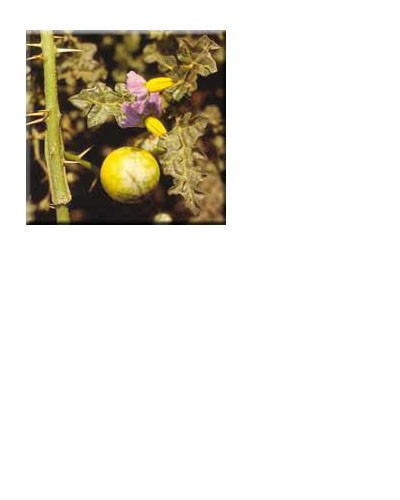Kateri Chhoti
Latin: Solanum Xanthocarpum
Therapeutic Action:
Fruits eaten as an anthelmintic and for indigestion. Root is an expectorant, used in Ayurvedic medicine for cough, asthma, chest pain. Also used for flatulence, sore throat, and toothache. Has high concentration of solasodine, a starting material for the manufacture of cortisone and sex hormones. It cures asthma, cough, bronchspasm, sore throat, constipation, an effective expectorant and diuretic. Bhavamisra, an ancient physician, mentions it as promoting conception in females. Given with honey, tulsi (Ocimum sanctum), datura (Datura metal), and black pepper it can be effective in cases of bronchial asthma. Kantkari (Solanum Xantho-carpum) is one of the members of the dasamula (ten root) of the Ayurveda. It is a very spiny diffuse herb up to 1.2 m tall, commonly found throughout India. The juice of berries is used in sore throat. Roots and seeds are administered as an expectorant in asthma and cough and pain in chest. Stem flowers and fruits are bitter and carminative and are prescribed for relief in burning sensation in the feet. Leaves are applied locally to relieve pain. The drug is collected mainly from the wild plants, as there is no systematic cultivation of the herb. They are 3-5cm long and 1.6-6 mm thick, dull grayish in colour with a soft fibrous structure. Pharmacological studies on this herb have shown that aqueous and alcoholic extracts of the plant possess hypotensive effect, which is partly inhibited by atropine (The Wealth of India). The herb is known as Kantakari and Nidigadhika in Sanskrit, in Hindi it is known as Kateli, Katai and Ringani, in Bengali Kantakari, in Marwari Bhuiringani, in Gujarati Bhoyaringani, in Telugu Pinnamulaka, Nelamulaka and Vankuda, in Tamil and Malayalam Kandankattiri, in Oriya Bhejibegun and Ankranti. In Punjab it is known as Kandyali, Mahori and Warumba and in Bihar Rengnie, Bhat-khataya and Rangaini Janum. English name is yellow berried nightshade. A total of four patents have been located; two patents granted in US, one in Russia and one application filed in India. Description: Kantkari (Solanum Xantho-carpum) is one of the members of the dasamula (ten root) of the Ayurveda. It is a very spiny diffuse herb up to 1.2 m tall, commonly found throughout India. The juice of berries is used in sore throat. Roots and seeds are administered as an expectorant in asthma and cough and pain in chest. Stem flowers and fruits are bitter and carminative and are prescribed for relief in burning sensation in the feet. Leaves are applied locally to relieve pain. The drug is collected mainly from the wild plants, as there is no systematic cultivation of the herb. They are 3-5cm long and 1.6-6 mm thick, dull grayish in colour with a soft fibrous structure. Pharmacological studies on this herb have shown that aqueous and alcoholic extracts of the plant possess hypotensive effect, which is partly inhibited by atropine (The Wealth of India). The herb is known as Kantakari and Nidigadhika in Sanskrit, in Hindi it is known as Kateli, Katai and Ringani, in Bengali Kantakari, in Marwari Bhuiringani, in Gujarati Bhoyaringani, in Telugu Pinnamulaka, Nelamulaka and Vankuda, in Tamil and Malayalam Kandankattiri, in Oriya Bhejibegun and Ankranti. In Punjab it is known as Kandyali, Mahori and Warumba and in Bihar Rengnie, Bhat-khataya and Rangaini Janum. English name is yellow berried nightshade.
References:
- Paranjape P 120-121
- Nadkarni, Vol I, P 1156 –1158
Used in:
- Cufsil Syrup
- Kufrex Syrup

Copyright 2013 Unexo Laboratories Pvt. Ltd. All Rights Reserved. Designed & Developed By: Credence Technologies


